Cardiff Queen Street railway station
Cardiff Queen Street railway station (Welsh: Caerdydd Heol y Frenhines) is a railway station serving the north and east of Central Cardiff, Wales. It is the second busiest railway station in Wales, being located near Queen Street, it is one of 20 stations in the city. It is, along with Cardiff Central, one of the two major hubs of the Valleys & Cardiff Local Routes local rail network. The station, and all of its services are run by Transport for Wales.
.jpg.webp) Cardiff Queen Street seen from the north. | |
| Location | Cardiff, City and County of Cardiff Wales |
| Coordinates | 51°28′55″N 3°10′13″W |
| Grid reference | ST188765 |
| Managed by | Transport for Wales |
| Platforms | 5 |
| Other information | |
| Station code | CDQ |
| Classification | DfT category C1 |
| Key dates | |
| 9 October 1840 | Opened as Cardiff Taff Vale |
| 1887 | Rebuilt and renamed Cardiff Queen Street |
| 1928 | Enlarged |
| 1973 | Rebuilt |
| 2014 | Redeveloped |
| Passengers | |
| 2015/16 | |
| Interchange | |
| 2016/17 | |
| Interchange | |
| 2017/18 | |
| Interchange | |
| 2018/19 | |
| Interchange | |
| 2019/20 | |
| Interchange | |
| Notes | |
Passenger statistics from the Office of Rail and Road | |
In 2014, a reconstruction of the station was completed in order to reduce bottlenecks, with two extra platforms being put in (a previously existing platform, opposite platform 4, and a new bay platform next to platform 2 for the line to Cardiff Bay), taking the total number of platforms to 5
History
Early history
The first station close to the site of the current station, was opened by the Taff Vale Railway in October 1840 and was known as Cardiff Taff Vale. This station had one platform to begin with, but a second was added in 1862, and at the same time, the head office of the Taff Vale Railway was moved alongside the station. In 1887, Taff Vale station was demolished and replaced by a new station with the current name Cardiff Queen Street, which at this time consisted of two through platforms and a south facing bay, all covered by a large overall roof.[1]
.jpg.webp)
Nearby, the Rhymney Railway built its own terminus just to the east of Queen Street called Adam Street in 1858. This was replaced in 1871 by a new station called Cardiff Crockherbtown which was a short distance to the north-east of Queen Street. Crockherbtown station was renamed Cardiff (Rhymney) in 1888 and then Cardiff Parade in 1924.[1]
The Taff Vale and Rhymney railways became part of the Great Western Railway (GWR) in 1922. As there was no longer any need for two rival stations in close proximity, on 15 April 1928, the GWR opened a short connection just north of Queen Street connecting the Ryhmney line to the Taff Vale line, this allowed Parade station to be closed and its services diverted to into Queen Street. In order to accommodate the extra Rhymney line services, Queen Street was enlarged at this time from three to five platforms, with the addition of a new island platform.[1]
1973 rebuild
The station remained fairly unaltered until 1973, when it was completely rebuilt by British Rail.[2] The rebuild saw the station's overall roof removed, the original Taff Vale station frontage and booking hall demolished and replaced with a modern structure, and the number of platforms reduced to three, consisting of a central island platform, and a south facing bay. Modern electric lifts were installed to take passengers from the subway to the new platforms. On the east side of the station, a large office block was constructed called Brunel House, which was until 1984, the headquarters of the Cardiff division of British Rail's Western Region[1][3]
In 1988, the entrance building was refurbished, and in March 1990, the bay platform 3 was turned into a through platform.[1]
In 2005, the station was fitted with new ticket gates, operational when the station is staffed, which allow easier access in both directions. In 2006 LED screens replaced the old information display monitors.
The old station car park is now dedicated for private use by residents of a nearby modern development of apartments known as "The Aspect".
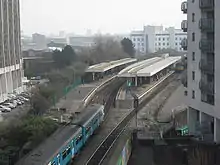
2014 redevelopment
As part of a £220m regeneration scheme to boost train capacity in Cardiff and the surrounding areas, Cardiff Central and Cardiff Queen Street stations were redeveloped from June 2014 and April 2013 respectively. The whole Cardiff Area Signalling Renewal project was completed by early 2017, funded by the Department for Transport, Assembly Government and Network Rail. The Assembly Government committed £17m for the enhancements programme.[4][5]
As part of the scheme, a new entrance building and two new platforms were constructed at Queen Street, bringing the number of platforms back up to the pre-1973 number of five, allowing the number of trains running through the station to be increased from 12 per hour to 16 per hour.[6] These included a second northbound through platform, and a south facing bay platform reserved for the shuttle service to Cardiff Bay. The new platforms were brought into use on Sunday 14 December 2014.[7]
Platform 1 is the new bay platform for the Cardiff Bay shuttle, platform 2 is for City Line services to Radyr and trains to Penarth, Platform 3 is for trains to Barry Island and the Vale of Glamorgan line, Platform 4 is for trains to Coryton and Rhymney and the new Platform 5 is for trains to Treherbert, Aberdare and Merthyr Tydfil.[8]
In the Spring of 2016, the Roll of Honour of those who served the armed forces between 1914 and 1919 from the Taff Vale Railway was put on display in the Ticket Hall. In November 2017, a QR Code was added to give more information about the men commemorated in the roll call.[9]
Gallery
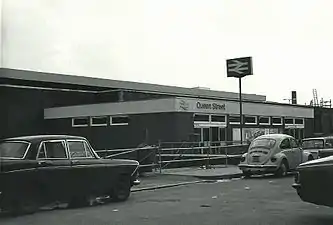 February 1975
February 1975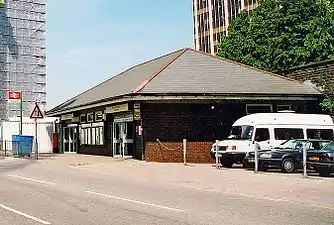 2001
2001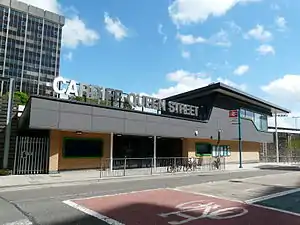 After redevelopment, May 2015
After redevelopment, May 2015
Services
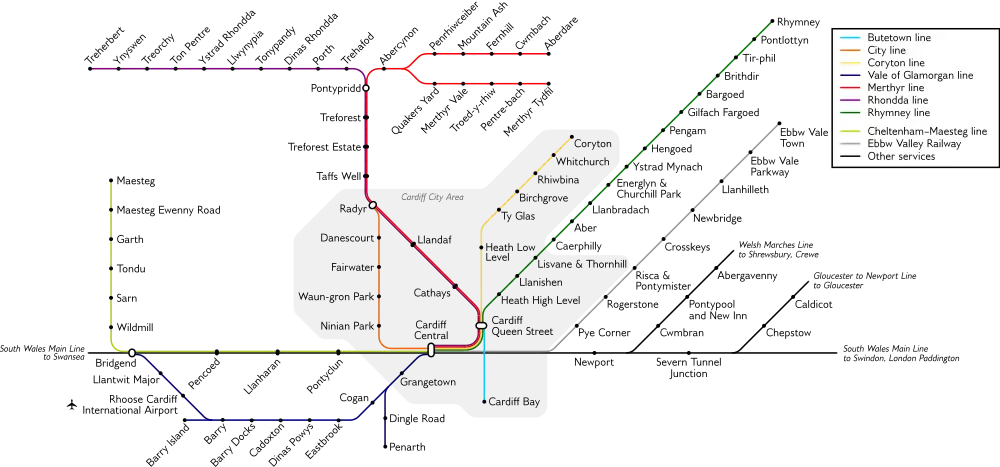
| Railway lines in Cardiff | ||||||||||||||||||||||||||||||||||||||||||||||||||||||||||||||||||||||||||||||||||||||||||||||||||||||||||||||||||||||||||||||||||||||||||||||||||||||||||||||||||||||||||||||||||||||||||||||||||||||||||||||||||||||||||||||||||||||||||||||||||||||||||||||||||||||||||||||||||||||||||||||||||||||||||||||||||||||||||||||||||||||||||||||||
|---|---|---|---|---|---|---|---|---|---|---|---|---|---|---|---|---|---|---|---|---|---|---|---|---|---|---|---|---|---|---|---|---|---|---|---|---|---|---|---|---|---|---|---|---|---|---|---|---|---|---|---|---|---|---|---|---|---|---|---|---|---|---|---|---|---|---|---|---|---|---|---|---|---|---|---|---|---|---|---|---|---|---|---|---|---|---|---|---|---|---|---|---|---|---|---|---|---|---|---|---|---|---|---|---|---|---|---|---|---|---|---|---|---|---|---|---|---|---|---|---|---|---|---|---|---|---|---|---|---|---|---|---|---|---|---|---|---|---|---|---|---|---|---|---|---|---|---|---|---|---|---|---|---|---|---|---|---|---|---|---|---|---|---|---|---|---|---|---|---|---|---|---|---|---|---|---|---|---|---|---|---|---|---|---|---|---|---|---|---|---|---|---|---|---|---|---|---|---|---|---|---|---|---|---|---|---|---|---|---|---|---|---|---|---|---|---|---|---|---|---|---|---|---|---|---|---|---|---|---|---|---|---|---|---|---|---|---|---|---|---|---|---|---|---|---|---|---|---|---|---|---|---|---|---|---|---|---|---|---|---|---|---|---|---|---|---|---|---|---|---|---|---|---|---|---|---|---|---|---|---|---|---|---|---|---|---|---|---|---|---|---|---|---|---|---|---|---|---|---|---|---|---|---|---|---|---|---|---|---|---|---|---|---|---|---|---|---|---|---|---|---|---|---|---|---|---|---|---|---|---|---|---|---|---|---|---|
| ||||||||||||||||||||||||||||||||||||||||||||||||||||||||||||||||||||||||||||||||||||||||||||||||||||||||||||||||||||||||||||||||||||||||||||||||||||||||||||||||||||||||||||||||||||||||||||||||||||||||||||||||||||||||||||||||||||||||||||||||||||||||||||||||||||||||||||||||||||||||||||||||||||||||||||||||||||||||||||||||||||||||||||||||
Queen Street is the main hub of the Valley Lines network – a railway system serving Cardiff, the Vale of Glamorgan, Bridgend and the South Wales Valleys – and has the solitary connection to Cardiff Bay. The station is located at the eastern end of the city centre, near the Capitol Centre as well as St David's Centre, and sees heavy volumes of commuter rail traffic during the rush hour.
The station has five utilised platforms at a level raised above the surrounding roads:
| _ | Direction | Line | Destination | Frequency |
|---|---|---|---|---|
| 1 | Southbound | Butetown Branch Line Shuttle | Cardiff Bay | 5t/h [12 min] |
| 2 | Rhymney Line | Penarth | 4t/h [15 min] | |
| Cardiff City Line | Radyr | 2t/h [30 min] | ||
| 3 | Vale of Glamorgan Line | Bridgend via Rhoose | 1t/h [60 min] | |
| Barry Island | 3t/h [15-30 min] | |||
| 4 | Northbound | Coryton Line | Coryton | 2t/h [30 min] |
| Rhymney Line | Rhymney | 1t/h [60 min] | ||
| Bargoed | 3t/h[upper-roman 1] [15 min][upper-roman 2] | |||
| 5 | Rhondda Line | Treherbert | 2t/h [30 min] | |
| Cynon Line | Aberdare | 2t/h [30 min] | ||
| Taff Line | Merthyr Tydfil | 2t/h [30 min] |
Platform 5 is used for services to Rhondda Cynon Taff (Aberdare, Merthyr Tydfil and Treherbert). Platform 4 is used for services to Rhymney and Bargoed as well as Coryton in north-west Cardiff. Platform 3 is used for services towards Cardiff Central and onwards to Barry Island and Bridgend via Rhoose Cardiff International Airport. Platform 2 is used for services towards Cardiff Central and onwards to Penarth and Radyr via City Line. Platform 1 is now only used for services to Cardiff Bay, which operate every 12 minutes.[10]
The typical Monday – Saturday service per hour (as of March 2016) is as follows:[11]
Northbound (towards Coryton and the Valleys):
- 6 trains per hour (tph) to Pontypridd via Cathays and Radyr, of which
- 2 tph continue to Aberdare
- 2 tph continue to Merthyr Tydfil
- 2 tph continue to Treherbert
- 4 tph to Ystrad Mynach, of which
- 2 tph to Coryton
Southbound (towards Cardiff Central, Cardiff Bay, The Vale and to Radyr via the City Line):
- 12 tph to Cardiff Central, of which
- 8 tph continue to Grangetown via the Vale of Glamorgan Line of which
- 4 tph continue to Penarth
- 4 tph continue to Barry, of which
- 3 tph continue to Barry Island
- 1 tph continues to Bridgend via Rhoose Cardiff International Airport
- 2 tph to Radyr via the Cardiff City Line
- 2 tph terminate
- 8 tph continue to Grangetown via the Vale of Glamorgan Line of which
- 5 tph to Cardiff Bay via the Butetown Branch Line
In popular culture
Both the station and this very page feature prominently in the Torchwood audiobook Ghost Train.
See also
Notes
- 3t/h terminate at Bargoed,...
- ...but the 1t/h travelling to Rhymney covers the exact same route, but continues for 4 more stops, so passengers travelling from Queen Street to Bargoed could get one of 4t/h.
References
- Walters, Laurence (1995). Railways of Cardiff. Ian Allan Ltd. pp. 72–86. ISBN 0-7110-2380-8.
- Hutton, John (2006). The Taff Vale Railway, vol. 1. Silver Link. ISBN 978-1-85794-249-1.
- "Cardiff Queen Street station gets its old platforms back as part of £220m rail improvement scheme" Archived 3 April 2016 at the Wayback MachineUrban 75 Blog article 27 February 2014; Retrieved 24 March 2016
- "£220m Cardiff and Valleys rail congestion scheme starts". BBC News. 6 August 2012. Archived from the original on 24 November 2018. Retrieved 23 November 2018.
- "Regenerating Cardiff Central & Queen Street". Premier Construction News. Archived from the original on 24 November 2018. Retrieved 23 November 2018.
- "Cardiff rail stations set for revamp". walesonline. 9 February 2011. Archived from the original on 28 April 2019. Retrieved 15 October 2019.
- "Early Christmas present for commuters as Network Rail says new platform at Cardiff Queen Street will be ready before the end of the year". Wales Online. 15 September 2014. Archived from the original on 24 November 2018. Retrieved 23 November 2018.
- "Cardiff's station upgrades begin to see real benefits". Rail.co.uk. 25 January 2015. Archived from the original on 24 November 2018. Retrieved 23 November 2018.
- "Rail workers' deaths in WW1 remembered". BBC. 9 November 2017. Archived from the original on 22 April 2019. Retrieved 15 October 2019.
- "Network Rail South Wales Valleys Business Plan 2007" (PDF). Archived from the original (PDF) on 7 June 2011. Retrieved 9 January 2008.
- GB National Rail Timetable 2015–16 Edition, Table 130 (Network Rail)
External links
![]() Media related to Cardiff Queen Street railway station at Wikimedia Commons
Media related to Cardiff Queen Street railway station at Wikimedia Commons
